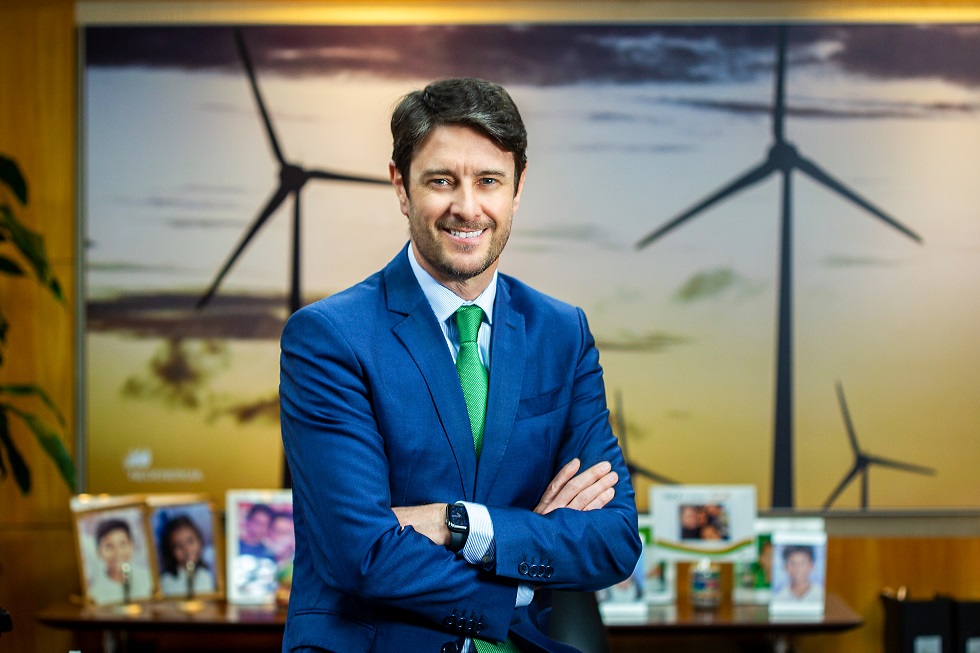2026-01-29
Neoenergia conquista Prêmio Ibero-Americano de Qualidade pelo desempenho de suas distribuidoras
2026-01-21
Alceu Valença e BaianaSystem se unem em parceria inédita para campanha de segurança na rede elétrica da Neoenergia no Carnaval
2026-01-14
Instituto Neoenergia destina mais de R$ 27 milhões em leis de incentivo para projetos sociais em 2025
2026-01-13
Neoenergia energiza último trecho da linha de transmissão Alto Paranaíba
2025-12-22
Neoenergia abre inscrições para sua primeira turma da Escola de Operadores do Centro de Operações Integradas
Eduardo Capelastegui, CEO of Neoenergia

Investing in electrical infrastructure is accelerating the future
The infrastructure sector is one of the most strategic in an economy. At the same time as driving economic development, it contributes directly to social change, promoting greater access to basic services, quality of life, job creation and territorial integration.
Data from ABDIB (Brazilian Association of Infrastructure and Basic Industries) shows that in the last five years, R$1 trillion has been invested in infrastructure in Brazil, 77% of which is private. The prominence of the electricity sector is a reality, since energy companies as a whole accounted for 45% of the R$260 billion investment in infrastructure in the country in 2024 alone, which has been driven by the expansion of generation, transmission and distribution capacity, the opening up of the market and greater demand for energy.
The role of the private sector, especially in the energy sector, has been led by large companies such as Neoenergia, which last year was the company that invested the most in infrastructure in the country, according to a survey by ABDIB itself: R$9.8 billion was earmarked by the company, mainly for the expansion and modernization of networks, with a focus on the continuous improvement of services. Bahia was the state that received the most funds, with R$3 billion allocated to the Neoenergia Coelba distributor, as well as generation and transmission assets that contribute to supply in the region.
In this scenario, the energy transition and the electrification of the economy impose additional challenges not only on the expansion of renewable generation, but also on the need to strengthen and expand the electricity infrastructure, with digitalized and resilient networks that meet current and future consumption needs.
The Brazilian electricity sector has come a long way in the last three decades, becoming a world reference for its predominantly renewable matrix, an integrated system and being the most universal public service in the country, delivering energy to 99.8% of the population.
However, the advance of renewable sources, the electrification of productive sectors and the exponential growth in the demand for energy has Brazil facing a strategic challenge: modernizing its electricity infrastructure to guarantee a stable, safe and affordable supply.
This movement requires robust investment, especially in the distribution and transmission networks, which are the foundation of the electricity system. The intermittency of renewable sources, such as solar and wind, imposes a new complexity on operations. Connecting these sources efficiently requires smarter grids, capable of handling variable flows and integrating storage and digital management technologies.
More than a technical necessity, this modernization represents an opportunity for Brazil, which has great potential to be a protagonist in the energy transition, contributing not only with a clean generation matrix, but also by repositioning Brazilian industry in the face of growing global demand for green products.
In this way, by strengthening the electricity infrastructure, the country creates the conditions for sustainable growth, attracts new investments and increases its competitiveness, as well as improving the experience of consumers, who are increasingly dependent on energy for their daily activities.
However, this transformation cannot take place in isolation. It requires coordination between public and private agents, with policies that encourage the digitalization of networks, the diversification of sources and low tariffs. The energy of the future must not only be clean, but also affordable and reliable.
The demand for investments in expanding networks will continue to heat up with the energy transition and the growth of renewables, as described in the PDE 2034, which forecasts more than R$130 billion in investments in transmission over the next decade. In the distribution segment, the challenge is even greater. According to ANEEL's Distribution Development Plan, more than R$ 235 billion will be needed by 2029, an increase of 85% over the previous period.
To make these investments viable, it is essential to discuss new sources of financing for the energy sector, which are more competitive in terms of price and offer long-term conditions in line with the nature of electricity infrastructure projects.
In addition, the extension of the electricity distributors' concessions is a strategic step to guarantee predictability and to ensure and anticipate the high volumes of investments planned for the distribution segment. It is also essential that the reform of the electricity sector, currently under discussion, takes these aspects into account and preserves regulatory and legal certainty, as has been the case in recent years.
For all these investments to be made and for Brazil to remain at the forefront of the global energy transition, it is necessary to maintain an adequate, predictable business environment with clear rules, ensuring that the transformation of the energy matrix is a reality and that its benefits are perceived by the entire Brazilian population. Only with these conditions will it be possible to attract private initiative and guarantee the continuity of the necessary investments.